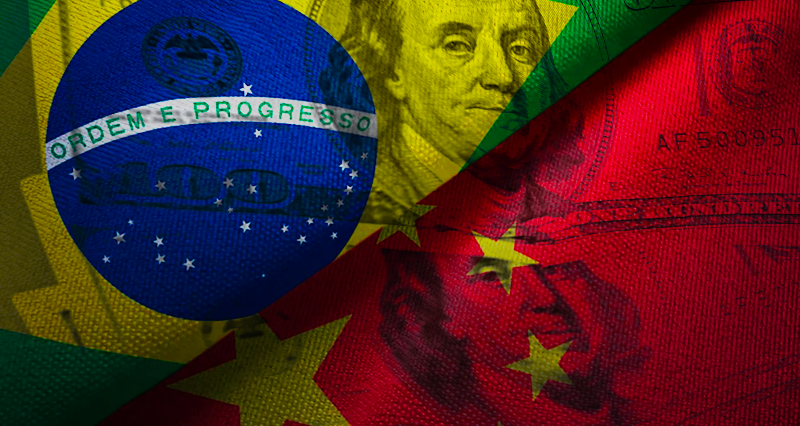By Ana Laura Dagorret / reporting from Rio da Janerio, Brazil *
The governments of Brazil and China have advanced in negotiations so that trade and investment between the two countries can be carried out directly between the Real and the Yuan. Said agreement intends to exclude the US dollar as a reference currency in transactions between the two giants, which would contribute to the loss of hegemony of the US currency globally.
At the end of January, the central banks of both countries signed a memorandum to establish a “clearing house” in Brazil. In practice, it is a bank chosen by the Chinese government – the ICBC – with liquidity in the Chinese currency to directly carry out foreign exchange compensation. This means that the businessman in Brazil would receive Yuan and, in that same bank, would exchange it for Reals.
According to a report published in November last year by the People’s Bank of China, by the end of 2021 there were 27 Chinese foreign exchange clearing banks in 25 countries. These include Canada, Germany, the United Kingdom, France, Luxembourg, Switzerland, Qatar, Taiwan, South Korea, Singapore and Australia. In South America, Chile has a similar agreement, as does Argentina. Even the United States has a “clearing house” for the direct exchange of currencies, appointed by the Chinese Central Bank.
From the Ministry of Finance they affirmed that “greater predictability of exchange rates” is very important for investors and traders. As they explain, taxes on exchange transactions are one of the points most questioned by Chinese partners in Brazil, and trade in local currency could contribute to increasing bilateral trade. The trade volume between the two countries reached 150 billion dollars last year, and Chinese direct investments in Brazil reached a cumulative 70 billion dollars. In addition, the progress of the negotiations for a Brazilian bank to join the Chinese payment system was welcomed. In turn, the BNDES also plans to launch new financing lines for bilateral trade.
The establishment of the bank authorized by China for cross-currency clearing is a first step to deepen bilateral trade between the two countries. In turn, this becomes another option for companies, although the idea is not to make it mandatory. For her part, Chinese Vice Minister of Commerce Guo Tingting also welcomed progress on the memorandum to establish a “clearing house” for the use of the Yuan. He affirmed that both countries are strategic partners and maintain a “model” relationship.
Businessmen consulted by various reports after the announcement of the Sino-Brazilian agreement affirm that the effects are still not clear. The Ministry of Finance understands that the use of Chinese currency can reduce costs. An executive from one of the largest meat-packing plants in Brazil said that the agreement could be interesting if the fact that it does not involve the dollar allows access to financing lines for exports, in Chinese banks, with lower interest rates. For Brazilian agro-exporters, the use of the dollar can be advantageous because, in addition to receiving in the US currency and having expenses in real, they can reduce the effects of the so-called “Brazil cost”.
For Tulio Cariello, Director of Content of the Brazil-China Business Council (CEBC), direct transactions would allow a reduction in financial costs, since by moving payments from the Chinese currency to the Dollar and then to the Real, or vice versa, there are exchange losses. Secondly, Yuan exchange rates, with greater control by the Chinese government, fluctuate less, providing greater predictability for businesses.
“It can be an alternative to reduce the transaction cost, to avoid two conversions,” says the former Secretary of Foreign Trade of the Ministry of Development Welber Barral in a report published by UOL. However, the agreement should not completely replace the use of the dollar in transactions with the Asian giant. Although Brazil can trade directly through other currencies, called convertibles -such as the Euro, the Swiss Franc and the Pound Sterling-, more than 90% of Brazilian foreign trade transactions are still carried out today in dollars.
According to the consultant Sérgio Quadros, director of SQ Asia Business Consulting, another advantage of direct transactions for Brazilian exporters is the possibility of opening a market in China. This is because the rules of the Chinese government’s capital control policy limit the access of local importers to the dollar. With direct transactions, it is possible to go beyond these limits. “There will certainly be an increase in trade,” he said.
Reducing dependence on the dollar is one of the lines of action of the foreign and financial policy of the countries that make up the BRICS, in a context of trade disputes and the economic war imposed by the United States on China and Russia, its two main competitors. In this sense, the agreement between Brazil and China not only deepens the transition towards multipolarity in financial relations, but also represents another step towards the loss of dollar hegemony.
Recently, the government of President Xi Jinping signed agreements with Saudi Arabia and Russia for the use of the Yuan in trade. The RMB has a share of around 2% in global payments, growing mainly around the Asian giant.
* International political journalist, co-author of the Brief Manual on Geopolitics and part of the PIA Global team.
This article was previously published on PIA Global, translation by UWI.

















Leave a Reply